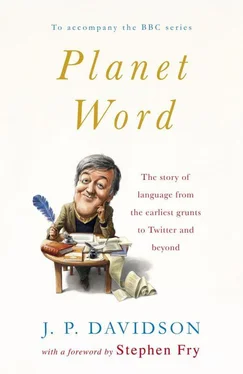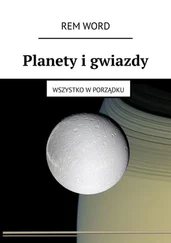Researchers have observed that Kanzi makes the same four sounds for four words: banana, grape, juice and yes . Could this be the beginnings of speech, or is it no more significant than a dog who gives a particular bark when it sees its master? Critics say Kanzi is reacting to body language and that researchers interpret his use of words too creatively. Dr Savage-Rumbaugh has tried to avoid the Clever Hans Effect by conducting some of her tests sitting very still and wearing a welder’s mask so Kanzi can’t see her face. She makes a series of unlikely requests, like ‘put the pine needles in the fridge’, which Kanzi almost always understands.
The debate continues. We’re certainly not imagining a future world of prattling primates as in Planet of the Apes . Perhaps the most useful way to look at it is this: just as Kanzi has turned out to be an accomplished crafter and user of stone tools, including some very sharp knives (which helps scientists understand skills used by our early prehistoric ancestors), so, at the very least, these talking experiments allow us a fascinating glimpse of a stage in the evolution of human language. But in the end the crucial difference is our brains. They are nearly four times the size of a chimp’s. It’s all about that extra kilo of grey matter.
With advances in medical technologies, science is at last beginning to penetrate one of the greatest mysteries of nature: that three pounds of mushy grey matter lodged between our ears, the human brain, the bodily organ which you are using to understand these words. Its ability to learn and process language is one of the true wonders of the universe.
Professor Cathy Price works at the Wellcome Trust Centre for Neuroimaging at the University College London medical school, one of the foremost research centres in neuroscience. Her research programme aims to create an anatomical model of how language works. Using structural and functional magnetic resonance imaging (MRIs, those huge doughnut-like machines which scan the body to create a three-dimensional image), she hopes to build a picture of which parts of the brain are used to process language. As is so often the case with the workings of the body, the insights into how they work are most evident when they stop working — jaundice tells us about the function of the liver in a way that a healthy liver simply cannot. Much of her research concerns how speech and reading are lost and recovered following strokes, when different parts of the brain are knocked out.
Cathy candidly confesses that, though she’s been studying the brain for a very long time, very little is understood. In fact, she says we are in the process of unlearning and dismantling what we thought we knew as these new techniques for looking into the fissures and folds of the brain are developed.

The classical view: the two major language centres of the brain
This classical view of the brain is the one we are familiar with from textbooks. Right, left hemisphere, cerebral cortex, cerebellum, basal ganglia, limbic system … It was Paul Broca, a French surgeon, anthropologist and member of the Academie Française, who first noticed that people who had suffered strokes in a certain area of the left inferior frontal lobe had problems with speech production. In 1868, he presented his findings to the British Association in Norwich, and in recognition of his pioneering work not long after it was decided to name this part of the brain Broca’s area. A Prussian neuropathologist called Carl Wernicke, reading Broca’s research, did his own and found out that his stroke patents who had suffered damage to the posterior left hemisphere had problems with speech comprehension rather than production. So this area of the brain was called Wernicke’s area. For a century and a half these two areas were believed to be the parts of the brain where language production and language comprehension were situated. Research by people like Cathy is now causing that theory to be revised.
What is now evident is that language occupies a far greater part of the overall brain’s activity than just the Broca and Wernicke areas — more than half the brain appears to be involved in some speech-related function. There are so many factors: the breathing, the shaping of the tongue and lips, fine motor control of facial muscles, control of the vocal chords, and that’s before any of the cognition processes begin. And here’s where the mystery deepens. Where does memory reside? How is it tapped? Do thoughts control language, and how do we then process the thought into the language we want? How does that work for bilingual or multilingual speakers?
‘I used to think my aim was to be able to understand language in the brain,’ says Cathy. ‘I’ve now reached the stage of my life where I don’t think it’s going to happen within my lifetime, and now I have much more specific aims as to how I can apply the information I have for clinical use. So I’ve gone from this big ambition — will we ever understand it? — down to much more specific aims that I think might be clinically beneficial.’
Cathy hopes that one day we will be able to have a more meaningful interpretation of how the brain works, but at present we don’t have a coherent story into which all the pieces fit. We might be able to colour it, make models of it, say this bit is working when we ask for a cup of tea and this bit when we feel anger or love, but the really big questions concerning the actual physiological nature of the organ are yet to be answered. So far, we’ve only just scratched the surface.
So have Cathy’s researches made her swing one way or another in the whole nature versus nurture debate as to how language is acquired? Her practical investigations into grey matter have made her believe there is a primal language structure in the brain, and it is remarkably consistent in all individuals, across all cultures and irrespective of whether the language is spoken, signed or even read as Braille.
So how, then, did this primal proto-human language emerge?

Noam Chomsky, father of modern linguistics
Noam Chomksy could be said to have invented modern linguistics. Of course, he is much more than this, but a half century of teaching, writing and being on the public stage has done little to reduce the public perception that Noam Chomsky is modern linguistics. His ground-breaking theory that homo sapiens has an innate language ability, and all grammars and syntax are essentially the same and hard-wired into our brains, remains his major contribution in the field.
Seeing how quickly and easily children learn language without any seeming effort, Chomsky posited that there is a ‘Language Acquisition Device’ (LAD) which is unique to humans. It’s this LAD, deep within our brains, that enables us to speak, whereas kittens or dormice are mute. According to Chomsky, there is a deep-set ‘Universal Grammar’ common to every human language.
Chomsky’s work with linguistics waned as he became more outspoken in his criticism of American foreign policy during the Vietnam War in the 1960s. His political activism (he calls himself a libertarian socialist or anarcho-syndicalist) has made him one of the most controversial intellectual figures in the USA. His linguistic theories, too, have divided opinion.
Читать дальше














